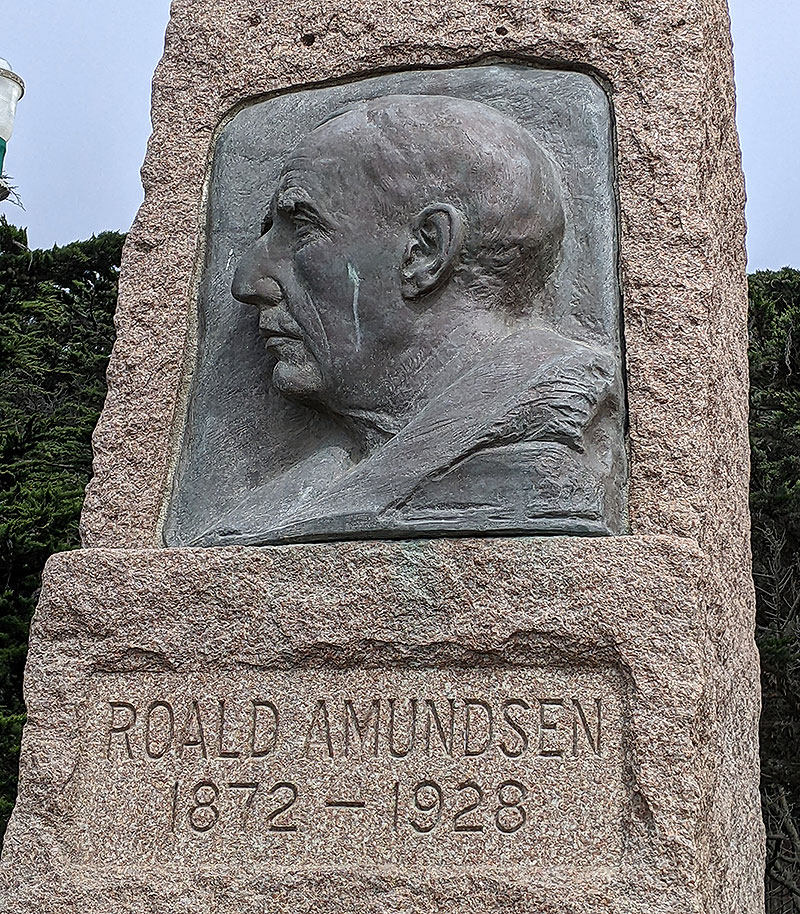Roald Amundsen and Gjoa memorial: Difference between revisions
(Created page with "'''<font face = Papyrus> <font color = maroon> <font size = 4>Primary Source</font></font> </font>''' 800px '''Queen Wilhelmina Windmill with the sailing ship ''Gjoa'' which occupied this spot near today's site of the Beach Chalet for many years.''' ''Photo: OpenSFHistory.org wnp27.0458'' [[Image:Amundsen-bauta 20220816 221356478.jpg}450px|left]] Roald Amundsen, th...") |
No edit summary |
||
| Line 7: | Line 7: | ||
''Photo: OpenSFHistory.org wnp27.0458'' | ''Photo: OpenSFHistory.org wnp27.0458'' | ||
[[Image:Amundsen-bauta 20220816 221356478.jpg | [[Image:Amundsen-bauta 20220816 221356478.jpg|450px|left]] | ||
Roald Amundsen, the Norwegian polar explorer, was the first to locate the magnetic North Pole and to navigate the Northwest Passage, the Arctic water route from the Atlantic to the Pacific. He left Norway with a crew of six on June 16, 1903 in a 69-foot-long converted herring boat named ''Gjoa''. Amundsen spent three years on the perilous journey. The ''Gjoa'' continued on, sailing through the Bering Straits and anchored off Point Bonita, outside the Golden Gate, on October 19, 1906. The San Francisco Norwegian community purchased the ''Gjoa'' from Amundsen and donated the ship to the people of San Francisco in 1909. In 1911, Amundsen became the first explorer to reach the South Pole. The ''Gjoa'' remained on this site at the western end of Golden Gate Park until 1972, when it was returned to Norway. The restored ship is now on display at the Maritime Museum in Oslo. | Roald Amundsen, the Norwegian polar explorer, was the first to locate the magnetic North Pole and to navigate the Northwest Passage, the Arctic water route from the Atlantic to the Pacific. He left Norway with a crew of six on June 16, 1903 in a 69-foot-long converted herring boat named ''Gjoa''. Amundsen spent three years on the perilous journey. The ''Gjoa'' continued on, sailing through the Bering Straits and anchored off Point Bonita, outside the Golden Gate, on October 19, 1906. The San Francisco Norwegian community purchased the ''Gjoa'' from Amundsen and donated the ship to the people of San Francisco in 1909. In 1911, Amundsen became the first explorer to reach the South Pole. The ''Gjoa'' remained on this site at the western end of Golden Gate Park until 1972, when it was returned to Norway. The restored ship is now on display at the Maritime Museum in Oslo. | ||
Latest revision as of 22:50, 21 May 2023
Primary Source
Queen Wilhelmina Windmill with the sailing ship Gjoa which occupied this spot near today's site of the Beach Chalet for many years.
Photo: OpenSFHistory.org wnp27.0458
Roald Amundsen, the Norwegian polar explorer, was the first to locate the magnetic North Pole and to navigate the Northwest Passage, the Arctic water route from the Atlantic to the Pacific. He left Norway with a crew of six on June 16, 1903 in a 69-foot-long converted herring boat named Gjoa. Amundsen spent three years on the perilous journey. The Gjoa continued on, sailing through the Bering Straits and anchored off Point Bonita, outside the Golden Gate, on October 19, 1906. The San Francisco Norwegian community purchased the Gjoa from Amundsen and donated the ship to the people of San Francisco in 1909. In 1911, Amundsen became the first explorer to reach the South Pole. The Gjoa remained on this site at the western end of Golden Gate Park until 1972, when it was returned to Norway. The restored ship is now on display at the Maritime Museum in Oslo.
The Amundsen monument is a bauta, or stone shaft, or Norwegian granite which was donated by Bay Area Norwegians, March 1, 1930.
Photos: Chris Carlsson




